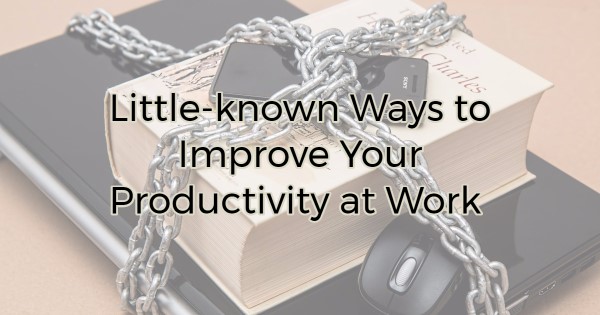Little-known Ways to Improve Your Productivity at Work

There’s never enough time in the day. To combat that, many of us stay up too late, swig coffee like it was water or guzzle energy drinks like they were air, and we sacrifice downtime for working towards getting that one last thing done before we leave. Many of us bring work home with us and check our emails before our feet hit the floor in the morning.
But it shouldn’t be about working harder. We need to find ways to work smarter. Here are some you may not have thought of:
1. Know How Much Time You Spend on Social Media. Seriously.
If you’ve ever struggled to lose weight, you may have lamented that it doesn’t make sense. You eat right and work out, yet the weight remains. It’s not until you start tracking everything that goes into your mouth that you realize what the culprit is. Tiny snacks like grabbing a Hershey’s kiss every time you walk by your co-worker’s desk. A handful of calories doesn’t seem like a big deal but they add up.The same is true of your time on Facebook and other social media sites. According to LearnStuff.com, over 12.2 billion collective hours are being spent browsing on a social network every day. Maybe you’re just watching one video while waiting on someone to go to lunch or before a meeting. But those minutes add up over the course of the day. When you start tracking your time on social, you could discover over the course of 8-10 hours you’ve wasted as much as 30 minutes. That’s 30 minutes you could use doing something much more productive.
Even if your job requires you to be on social media, make sure what you’re doing is strategic and not just scanning streams with no direction.
2. Avail Yourself of Abridged Learning Opportunities in the Community
Much of what we know about good business practices and social media features seem to change overnight. You can spend your day learning everything you need to know about these things 1-2 times a month but that requires first doing the research and then learning the concepts or new features. Is that really an effective use of your time?You need to know the information but you don’t need to be the one to compile it or teach it to yourself. There are people in your community who are already doing that. Your local chamber of commerce may have learning sessions on valuable topics to you and your business. The small business administration or economic development council may as well. Best of all, these courses or learning sessions are all very reasonably priced. If your time is worth more than $20 an hour, you should look into these options.
3. Know Yourself
When it comes to productivity you are either a to-do list person or an “eat the frog” worker. A to-do list person often enjoys checking off completed items on the to-do list. This type of personality works best when building momentum. Write out a to-do list. Assuming the items are all similar deadlines, look for your quick wins. Quick wins are tasks you know you can get done quickly. Getting them done in the first part of your day will give you energy because you see a large part of your to-do list getting conquered early on.On the other hand, if you’re a morning person who loses a lot of steam in the afternoon, you’ll want to “eat the frog.” The “eating the frog” tactic is based on the funny advice often attributed to Mark Twain. It advises that if you eat a live frog first thing each morning, you'll have the satisfaction of knowing that it's probably the worst thing you'll do all day. People who do best by “eating the frog” thrive on tackling the day’s hardest to-do list item first thing.
Figure out which one of these personalities you are. Do you love to see change in your to-do list or are you at your most productive first thing and need that energy to tackle the tough stuff? Whichever you are, schedule accordingly. Important to note, if you are an “eat the frog” type worker avoid early a.m. meetings. They will eat-up your most productive time. If you are a to-do list person, break large tasks into smaller ones even though they will make your to-do list look longer. Checking off small tasks builds momentum, which fuels your energy.
Becoming more productive generally, doesn’t take sweeping changes. It’s about recognizing the drains on your day and eliminating as many of them as you can. You may not be able to get out of every meeting or meaningless conversation but if you start turning your efforts to working smarter instead of harder, you’ll be able to find small pockets of time in your day and that will help you regain control of it.
